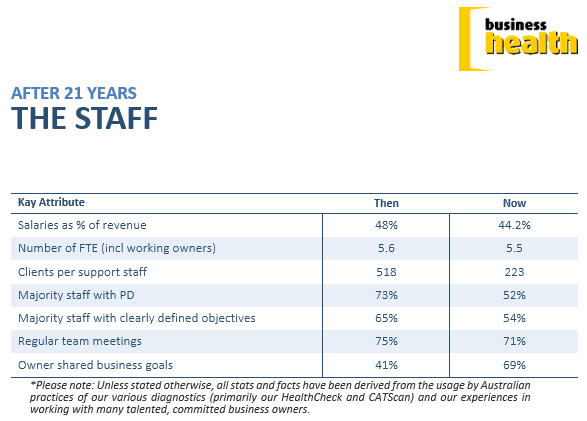In the final of this three-part series, the team at Business Health outline five key observations around managing and working with staff in advice businesses. The excellent tips they also offer are based on the work they have conducted with advisers over the last 21 years…
Observation 1
Not surprisingly, salary costs have always comprised the largest part of the expense budget for practices. And this hasn’t really changed much over our 21 years. In a similar way, clients haven’t wavered greatly in their views of your people – they have continued to rate ‘Staff’ highly through our CATScan client surveys.
Accepting that people are so important to the business, doesn’t it make sense that the owner should regularly check in on how they’re travelling and how satisfied, or not, they are at the moment? The finding from our latest analysis, that one in four practices had not undertaken any form of staff feedback in the last 12 months, raised a few red flags for us.
Observation 2
Sharing business goals with staff has been a very big mover over the years, with an increasing number of owners being willing to do so. No doubt the trend to transparency and openness has been accelerated by the uncertainties of the last few years and the desire for staff to have confidence in their employer’s longer term plans.
Observation 3
When competition for ‘good’ people is as strong as it is today, the practice must be able to clearly articulate its Employee Value Proposition – to address the question, why should I work for you (and not one of your competitors)? Maybe the question has even moved to – why should I work in the financial advice sector at all?
- Employees are less patient, more aware, mobile and they have alternatives!
- Reports from HR specialists over many years have confirmed that remuneration per se, while important, wasn’t necessarily the highest on the employee’s ‘need to have’ list. Flexible working arrangements (including working remotely full-time), culture and job security have been consistently ranked above remuneration.
- Today’s employees are also interested in the attitudes and values of employers (both large and small). How do they feel about equality, diversity and opportunity, ethical investments and community for example.
Observation 4
WFH is now destined to remain a permanent feature of our modern workplace for many practices…
While Covid may have forced practices to transition to ‘working from home’ in 2020, its generally accepted that this shift was already underway and WFH is now destined to remain a permanent feature of our modern workplace for many practices. Easy to say perhaps (especially when there was no other option last year), but it will require some changes – to not only the work processes and flows, but also to the attitude and philosophy of every person on the payroll. Fortunately, there are a lot of experts who will be able to guide you through the challenges WFH will throw up.
There are at least two other WFH opportunities, worthy of note:
- Employers now have access to the whole marketplace when looking for new staff, who could very well be interviewed, appointed and employed without actually meeting the boss and/or colleagues in person.
- Similarly, the target market for new clients has gotten much bigger.
Observation 5
‘Never hire someone you can’t fire’ was the philosophy, borne out of much experience, of one of our favourite US clients. Another was – ‘hire slow, fire fast’. The point underlying these views was – appointing people to your firm is an extremely important function. Not to be rushed or poorly implemented. And, if per chance, the employer made a poor selection choice they should move quickly to remedy the position.
Tips
- Incorporate a staff satisfaction survey into your business routine. Confidential, benchmarkable and independently managed is best. Keep an open mind to what your staff tell you and respond accordingly.
- A clearly documented onboarding process for new staff members will become even more important going forward as it will allow the principal to establish the appointee’s role, as well as the overall working environment and culture of the practice.
- As ‘old school’ as it may seem, clearly documented and up to date job descriptions, which are supported by regular performance appraisals are as important and relevant as they have ever been. Perhaps even more so today. We’re hoping that the ‘Then/Now’ comparison isn’t the start of a trend.
- If you don’t already do so, prepare an annual benefits summary for each employee outlining all of the benefits the employee is receiving, including the non-monetary benefits such as professional development, flexible working hours, WFH strategy, bonus programs, equity sharing, community involvement and family engagement. Wherever possible, put a dollar cost against each of them. The sum of all of these is the real benefit you’re providing – if it’s competitive, reinforce it regularly. And, if it isn’t?
- Accepting that WFH is here to stay for many, here are a couple of the most important areas which will need to be proactively addressed if the practice is to be successful in employing a WFH strategy in the longer term for its staff:
- Don’t ease up on the communication. In fact, it’s possibly more important than ever that the regular team meetings, work in progress updates and social events are continued.
- And, while technology facilitated communication is effective, nothing can fully replace the benefits of in person meetings, so video is a crucial tool. As are strategies to bring staff together into a central location for an update or training day on a regular basis.
- IT security – ensure you have appropriate cyber, password protection, insurance and training (initial and ongoing) in place. With more people working remotely new cyber threats will continually emerge and all businesses (large and small) must be satisfied that they’re adequately protected.
- ‘State of the Nation’ discussions – we encourage every business owner to take the opportunity to regularly update the staff on the business. Is it on track to its plan? Has anything changed to the business’ big picture? What about the owners?


Business Health is an independent organisation specialising in customised advice and solutions to the financial services industry…








